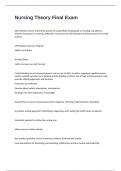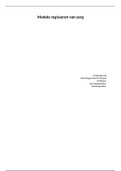Nursing Theory Final Exam
Self reflection correct answersThe process of purposefully thinking back or recalling a situation to
discover its purpose or meaning. Reflection is necessary for self-evaluation and improvement of nursing
practice.
CNO Quality Assurance Program
-Reflect on Practice
Nursing Theory
-Reflect on your own Self Concept
Critical thinking correct answersA process and as a set of skills; an active, organized, cognitive process
used to carefully examine one's thinking and the thinking of others. Use of logic and reasoning to make
accurate clinical judgements and decisions
Purposeful and reflective
Examine ideas, beliefs, assumptions, principles etc.
Develops over time (experience, knowledge)
Nursing Process correct answersAssessment, Diagnosis, Planning, Implementation, Evaluation.
A problem-solving approach to identifying, diagnosing, and treating the health issues of patients.
Systematic approach to delivering nursing care
Allows nurses to think critically
Best practice guideline correct answersare evidence informed and contain
recommendations for developing and sustaining collaborative practice models and leadership.
,Critical Thinking Level 1 - Basic correct answersThinking is concrete and based on rules/guidelines
Critical Thinking Level 2 - Complex correct answers-Consider other options in addition to the basic
-More creative and innovative
-Weigh benefits and risks
Critical Thinking Level 3 - Commitment correct answers-Make choices on your own, take full
responsibility
-Anticipate needs
5 components of Critical Thinking correct answers1. Specific Knowledge Base:
-Education (sciences, theory, humanities, behavioural, nursing sciences)
-Important to admit limitations in your knowledge
2. Experience:
-Clinical experiences (nursing school and professional employment)
-Other work experiences
3. Competencies:
-Cognitive processes
a) General - Scientific Method, Problem Solving, Decision Making
b) Specific-Diagnostic reasoning and Clinical decision making.
-Determining health status of patient after you have gathered all important assessments (physical, social,
psychological)
c) Nursing Process
,-Five step clinical decision making approach
4. Attitudes:
Need certain attitudes to think 'critically'
Curious, open minded, discipline, perseverance, honesty, fairness, aware of knowledge gaps, self-aware
and reflective (bias, beliefs, assumptions)
5. Standards
Intellectual Standard: guideline for rational thought (thoroughness, accuracy, precision)
Professional Standards: ethical, evidence informed, and within professional responsibility
Ex. Provide care that is safe, competent, compassionate, preserves dignity and confidentiality, promotes
justice, maintains clients sense of self
See CNO Professional Standards
*Practice Question*
You are teaching a 12-year-old boy how to self-administer insulin. After discussing the techniques and
demonstrating an injection, you ask him to try it. After two attempts, it is obvious that he does not
understand how to prepare the correct dose. You review your approach with the patient carefully and
ask a colleague for her suggestions about how to improve your teaching skills. This is an example of
1. Reflection
2. Risk taking
3. Patient assessment
4. Care plan evaluation correct answers1. Reflection: An important aspect of critical thinking is reflection:
the process of purposefully thinking back or recalling a situation to discover its purpose or meaning.
Nurses should think back on a patient situation, make sense of the experience, and thus gain insight into
the meaning of the situation.
, *Practice question*
A nurse uses an institution's procedure manual to confirm how to change a patient's nasogastric tubing.
The level of
critical thinking the nurse is using is
1. Commitment
2. Scientific method
3. Basic critical thinking
4. Complex critical thinking correct answers3. Basic critical thinking: At the basic level of critical thinking,
a learner trusts that experts have the right answers for every problem. Thinking is concrete and based on
a set of rules or principles.
For example, a nurse uses an institution's procedures manual to confirm how to complete a specific
procedure.
*practice question*
A patient had hip surgery 24 hours ago. The nurse refers to
the written plan of care, noting that the patient has a device
collecting wound drainage. The physician is to be notified
when the accumulation in the device exceeds 100 mL for the day. When the nurse enters the room, the
nurse looks at the device and carefully notes the amount of drainage currently in the device. This is an
example of
1. Planning
2. Evaluation
3. Intervention
4. Nursing diagnosis correct answers2. Evaluation: The nursing process consists of five
steps: assessment, nursing diagnosis, planning, implementation, and evaluation. During the evaluation
phase, the nurse evaluates whether the nursing action has been effective.





